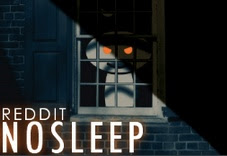PLEASE NOTE, THIS FEATURE WAS FIRST PUBLISHED AT UK HORROR SCENE HERE. ALL SUBSEQUENT CHAPTERS WILL APPEAR AT UKHS FIRST.
An Introduction to Creepypasta
For
as long as mankind has communicated with one another, we have told frightening
tales of the macabre that act as warnings. From the monsters of ancient mythology
to cautionary urban legends, people have always been drawn to spreading stories
of a darker nature. They serve a purpose — giving a face to a fear or a very
real danger we all face.
Worried
about children drowning in the river that runs through your village? Invent
tales of some terrible malevolent beastie that lives in it and will gobble them
up should they stray too close.
Concerned
about the chance that your youngsters could fall afoul of the many risks of
having sex too young? Spread stories of a hook-handed maniac who loves to
slaughter teens who canoodle in parked cars.
The
internet age has revolutionized communication in ways that are almost
immeasurable – and that includes the telling of horror stories.
What
I aim to do in this series of feature is to take a look at the extremely
popular digital storytelling trend of Creepypasta.
For
those of you who don’t know, the term Creepypasta is descended from ‘Copypasta’
— an online slang term that originated among 4chan users used to describe a block
of text or image that is spread throughout the internet via users who copy and
paste (get it, copy + paster = Copypasta) on web forums and sites such as the
aforementioned 4chan and reddit. In the case of Creepypasta, it is disturbing
or frightening content spread in this manner.
The
term has been in use for some time now (since the mid-late Noughties) and has
built a huge online presence.
While
early examples simply took old-fashioned urban legends that had been doing the
rounds for some time and just retold them via email (for example, the popular
myth debunking site snopes.com tells of the oft recited ‘gang high-beam
initiation ritual’ tale being circulated via email as early as the late
Nineties!), it didn’t take long for the web to birth its own horrors.
From
emails concerning web horrors (one famous hoax involves a serial killer with 56
victims to his name who finds his victims over the internet), the stories
developed and became less about tricking readers and more about scaring a
willing audience — one prepared and able to suspend disbelief and accept one
another’s tales of the macabre no matter how far-fetched they may be. Stories
are now told through sites dedicated to such fiction, such as the thriving
nosleep subreddit, by writers who have genuine skill in crafting and
structuring short stories, and some have attracted huge followings.
Arguably
the biggest of these is the Slender Man mythos, which sprung up after some
skillfully photoshopped black and white images by ‘Victor Surge’ (real name Eric
Knudsen) were posted in the forum pages of web site Something Awful during
2009.
Since then the mysterious, tall, thin, faceless, besuited entity has inspired films, stories and videogames and it has become a legitimate cultural phenomenon. Tragically, an obsession with the Slender Man mythos was even implicated as playing a part in an attempted murder in Waukesha, Wisconsin on 31 May, 2014, when two 12 year old girls stabbed a girl of the same age. Thankfully the young lady survived, by the resulting media furore brought even more attention to one of the internet’s most enduring myths.
However,
Slendie (as fans have lovingly nicknamed the creature) is not the only
Creepypasta creation to make a significant cultural impact. Creations such as
Smiledog, The Rake and Jeff the Killer are just as recognizable to Creepypasta
aficonados, while creepy tales such as Candle Cove, The Russian Sleep
Experiment, Normal Porn For Normal People, The Smiling Man, The Grifter and
Psychosis have been read hundreds of thousands of times.
In
the weeks ahead, I aim to introduce you to some of the very best and most historically
significant Creepypastas to have ever hit the darkest corners of the web, and
examine how and why they work so well.
Until next time, I hope you enjoyed your stay.




No comments:
Post a Comment